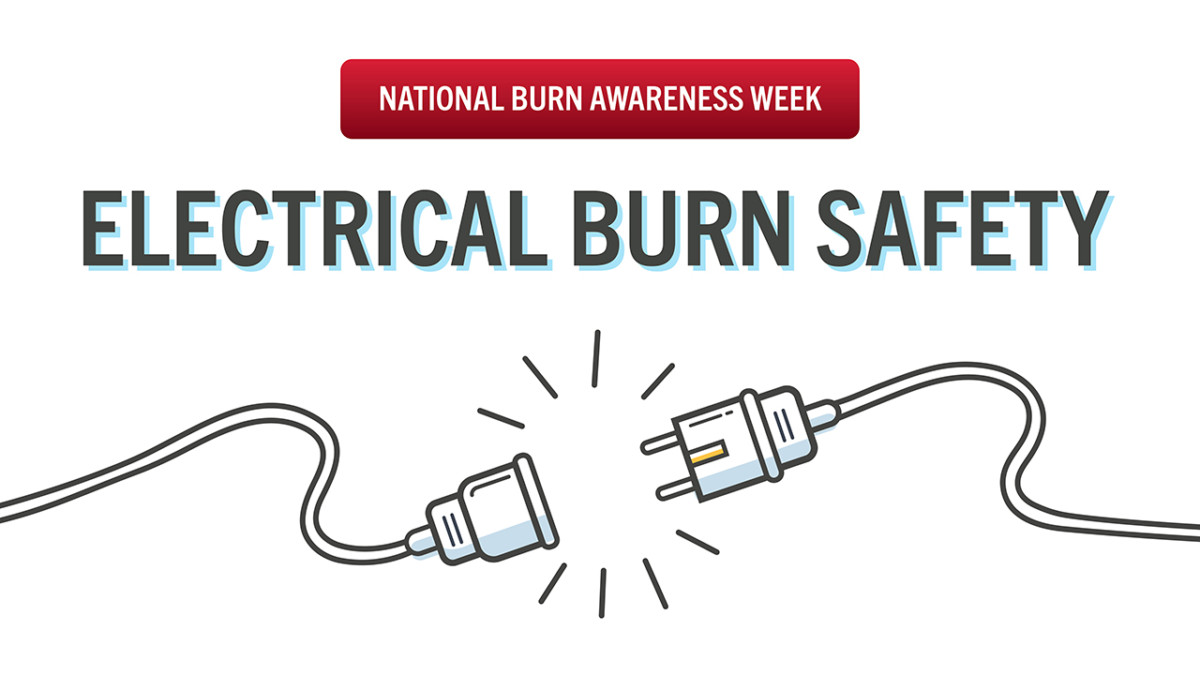Get amped up for Burn Awareness Week by helping Burn and Reconstructive Centers of America raise awareness for electrical safety.
National Burn Awareness Week is observed the first full week of February and promotes safety education and burn prevention. This year, the American Burn Association (ABA) has dedicated the week to electrical safety from A to Z (from Amps to Zap). In a world driven by technology, Beretta Craft-Coffman, PA-C, and Vice President of non-physician providers, of Burn and Reconstructive Centers of America believes you can never be too careful when it comes to handling electrical devices and appliances.
“Our everyday lives run on electricity, from our coffee in the mornings to our cellphones, cars, and even some types of beds. These devices have the ability not only to catch fire but to produce serious contact burns and electric shocks. Electric burns can be some of the most severe, which is why people should take as many precautions as possible to prevent them from happening,” she said.
Craft-Coffman recommends the following tips when using electrical products:
- Never use cords that are frayed or show signs of wear.
- Ensure that all outlets have faceplates.
- Never piggyback plugs. There should be no more than one plug in each receptacle and no more than two plugs per outlet.
- When using heating appliances like coffeemakers, toasters, and space heaters, plug them directly into a wall outlet. They should be the only thing plugged into the outlet during use.
- Large appliances like refrigerators, washers, dryers, microwave ovens, and air conditioners should be plugged directly into a wall outlet.
- All light fixtures and lamps should have shades or globes to prevent contact burns and fires.
- Ensure all lightbulbs are tightly screwed in, and they are the proper wattage for the light fixture.
Electrical injuries can happen to anyone in the family, regardless of age. Burn centers across BRCA’s network treat young patients injured chewing on wires or sticking small objects into outlets too often for comfort. Though not always preventable, there are a few extra steps that can be taken to reduce the risk of electrical injury to little ones.
“I always suggest keeping wires and cords out of reach of children and dogs or at least unplugging them when they aren’t in use. And use outlet plug covers. As hard as any parent tries, there are times we aren’t looking, and outlet plug covers are never bad things to have in place for times like that,” said Craft-Coffman.
Another important step toward electrical safety in in your home is the installation of circuit interrupters. Of all electrical fires, wiring and electrical distribution account for a majority of them. Circuit interrupters are essential to preventing these types of fire hazards, specifically arc-fault circuit interrupters (AFCIs) and ground-fault circuit interrupters (GFCIs). AFCIs automatically shut off the electricity under dangerous conditions, such as sparking or arcing due to loose or corroded wires. GFCIs protect against shock hazards, which is why they are normally installed in bathrooms, kitchens, garages, and basements. Working in tandem, these two types of circuit interrupters directly aid in preventing fires and electrical injuries.
“A fire can disrupt every part of someone’s life. Emotionally, mentally, and financially, these types of tragedies take a toll on people,” said Craft-Coffman. “If there is anything that seems off or out of the ordinary about the lights or outlets, it is always a good idea to have someone inspect them.”
Call an electrician as soon as possible if any of the following apply:
- Your wall outlets look discolored or feel warm to the touch.
- Your outlets spark when you plug in or unplug cords.
- You smell a burning or rubbery smell around your appliances.
- You experience a tingling feeling when you touch light switches.
- Your lights frequently flicker or dim for no known reason.
- You frequently have blown fuses or tripped circuit breakers.
